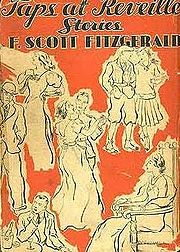
Taps at Reveille
Encyclopedia

F. Scott Fitzgerald
Francis Scott Key Fitzgerald was an American author of novels and short stories, whose works are the paradigm writings of the Jazz Age, a term he coined himself. He is widely regarded as one of the greatest American writers of the 20th century. Fitzgerald is considered a member of the "Lost...
. It was the fourth and final collection of short stories Fitzgerald published in his lifetime. All were timed to appear a few months to a year after each of his four completed novels were published.
Contents
The eighteen stories collected in Taps at Reveille are:- "The Scandal Detectives"
- "The Freshest BoyThe Freshest BoyThe Freshest Boy is a short story by American writer F. Scott Fitzgerald. It was first published in The Saturday Evening Post 28 July 1928. It was reprinted in Fitzgerald's 1935 collection, Taps at Reveille.-Plot:...
" - "He Thinks He's Wonderful"
- "The Captured Shadow"
- "The Perfect Life"
- "First Blood"
- "A Nice Quiet Place"
- "A Woman with a Past"
- "Crazy SundayCrazy SundayCrazy Sunday is a short story by F. Scott Fitzgerald originally published in American Mercury on October 1932.-Plot:The story centers on a young screenwriter, Joel Coles, as he comes to terms with his personal and professional failures. Coles is already 28 and has not yet distinguished himself....
" - "Two Wrongs"
- "The Night of Chancellorsville"
- "The Last of the Belles"
- "Majesty"
- "Family in the Wind"
- "A Short Trip Home"
- "One Interne"
- "The Fiend"
- "Babylon RevisitedBabylon Revisited"Babylon Revisited" is a short story by F. Scott Fitzgerald, written in 1930 and first published on February 21, 1931 in the Saturday Evening Post. It was later adapted into a movie called The Last Time I Saw Paris.-Summary:...
"
Publication
Taps at Reveille was published on March 10, 1935. The collection was dedicated to Fitzgerald's agent Harold OberHarold Ober
Harold Ober was an American literary agent.In 1907 — two years after graduating from Harvard with a degree in literature — Harold Ober became a literary agent at the Paul R. Reynolds Literary Agency. By 1908 he was representing such authors as Jack London and H. G. Wells. In 1929, he opened his...
.
Reception
In The New York TimesThe New York Times
The New York Times is an American daily newspaper founded and continuously published in New York City since 1851. The New York Times has won 106 Pulitzer Prizes, the most of any news organization...
, critic Edith Walton gave Fitzgerald's final collection a mixed reception. "The characteristic seal of his brilliance stamps the entire book, but it is a brilliance which splutters off too frequently into mere razzle-dazzle." Citing the Basil Duke Lee
The Basil and Josephine Stories
The Basil and Josephine Stories are a collection of short stories by F. Scott Fitzgerald. The title characters were intended by Fitzgerald to meet each other but this never happened in his literature....
stories as "small masterpieces," Walton called Babylon Revisited
Babylon Revisited
"Babylon Revisited" is a short story by F. Scott Fitzgerald, written in 1930 and first published on February 21, 1931 in the Saturday Evening Post. It was later adapted into a movie called The Last Time I Saw Paris.-Summary:...
"probably the most mature and substantial story in the book. A rueful, though incompleted, farewell to the Jazz Age
Jazz Age
The Jazz Age was a movement that took place during the 1920s or the Roaring Twenties from which jazz music and dance emerged. The movement came about with the introduction of mainstream radio and the end of the war. This era ended in the 1930s with the beginning of The Great Depression but has...
, its setting is Paris and its tone one of anguish for past follies." Walton continues, "It has become a dreadful commonplace to say that Mr. Fitzgerald's material is rarely worthy of his talents. Unfortunately, however, the platitude represents truth. Scott Fitzgerald's mastery of style — swift, sure, polished, firm — is so complete that even his most trivial efforts are dignified by his technical competence. All his writing has a glamourous gloss upon it; it is always entertaining; it is always beautifully executed."
External links
- Taps at Reveille, in wikilivres.info
- The New York Times on Taps at Reveille
- F. Scott Fitzgerald Centenary: Matthew J. Bruccoli Collection at the University of South Carolina

